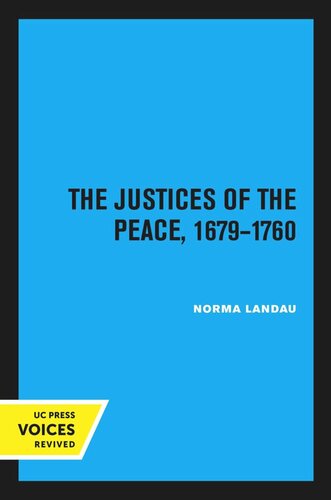

Most ebook files are in PDF format, so you can easily read them using various software such as Foxit Reader or directly on the Google Chrome browser.
Some ebook files are released by publishers in other formats such as .awz, .mobi, .epub, .fb2, etc. You may need to install specific software to read these formats on mobile/PC, such as Calibre.
Please read the tutorial at this link. https://ebooknice.com/page/post?id=faq
We offer FREE conversion to the popular formats you request; however, this may take some time. Therefore, right after payment, please email us, and we will try to provide the service as quickly as possible.
For some exceptional file formats or broken links (if any), please refrain from opening any disputes. Instead, email us first, and we will try to assist within a maximum of 6 hours.
EbookNice Team

Status:
Available0.0
0 reviews
ISBN 10: 0520312341
ISBN 13: 9780520312340
Author: Norma Landau
In the eighteenth century the justices of the peace governed England. While Parliament debated questions of trade, taxation, and foreign policy, the justices administered England's internal affairs. So powerful were the later Stuart and early Hanoverian justices that they were virtually independent, and it is their independence which makes them fascinating. Neither the central government nor Parliament told them what to do, closely supervised their activity, or even insured that they at at all. What tid the justices choose to do? In what manner did they do it? why, indeed, did they assume the burdens of local government? Norma Landau examines the office of justice of the peace from the viewpoint of the justices themselves, delineating those ideals and inducements inherent in local government which prompted the English elite to assume their distinctive role as paternal rulers. Through analysis of the appointment of justices, the political and social composition of the bench, the institutions of local government, the justices' administrative and judicial activities, and manuals written for justices, this study traces the evolution of the elite's conduct of government an dof their concept of their relation to those they governed. Through analysis of the appointment of justices, the political and social composition of the bench, the institutions of local government, the justices' administrative and judicial activities, and manuals written for justices, this study traces the evolution of the elite's conduct of government and of their concept of their relation to those they governed. Because the justices were so important, discussion of their role touches upon some of the major debates in current historiography: the debate on the nature of politics; on the relation of rulers to the governed in a "deferential society"; on the definition of the elite in early modern society; on the course of of administrative development; and on the relation of law to images of authority. This portrait of the justices illuminates a crucial stage in the tranformation of England's rulers from local patriarchs to administrators for the nation. This title is part of UC Press's Voices Revived program, which commemorates University of California Press's mission to seek out and cultivate the brightest minds and give them voice, reach, and impact. Drawing on a backlist dating to 1893, Voices Revived makes high-quality, peer-reviewed scholarship accessible once again using print-on-demand technology. This title was originally published in 1984.
PART ONE The Justices’ Influence
The Uses of Justice
CHAPTER TWO Lex Loquens
PART TWO The Justices and the Parties
CHAPTER THREE The Making of a Justice, 1679-1725
CHAPTER FOUR The Making of a Justice, 1725-1760
CHAPTER FIVE Political Ideologies and Partisan Portraits
PART THREE The Work of Kent’s Justices
CHAPTER SIX The Single Justice: Varieties of Paternalism
CHAPTER SEVEN Petty Sessions
CHAPTER EIGHT Quarter Sessions
PART FOUR The Image of the Bench
CHAPTER NINE By the Company they Keep
CHAPTER TEN The Bench of Kent
CHAPTER ELEVEN Models of the Model Justice
Appendices
justices of the peace significance
justices of the peace and constables association
justice of the peace 6-1
justice of the peace 4-1
3 justices of peace
what did the justices of peace enforce
Tags: Norma Landau, Justices, Peace